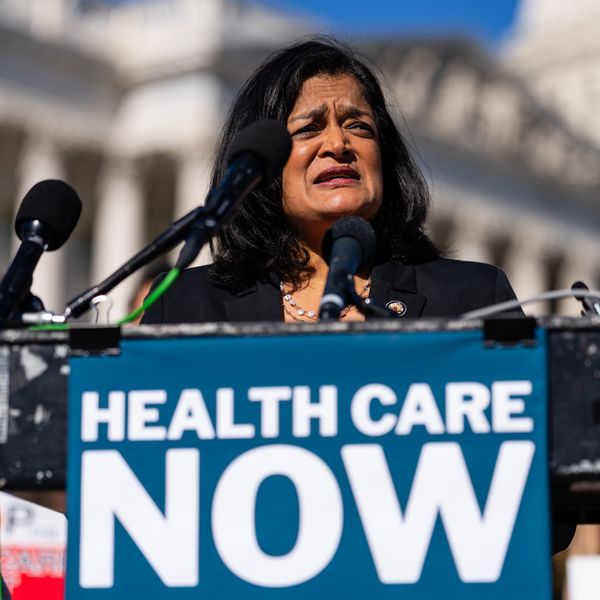This vote was also a political win. It was a big deal for
politicians-like Barack Obama, Max Baucus, Rahm Emanuel, and Harry
Reid-who cared more about putting up a "W" on the scoreboard than about
the policy. It was also a big day for senators like Blanche Lincoln,
Mary Landrieu, Ben Nelson, and Joe Lieberman. The incredibly broken
rules of the Senate gave them an absurd amount of anti-constitutional
power that allowed them to hold reform hostage for pork and industry
favors.
It was loss for the country. Our broken health care system will
remain broken and costs will continue to rise at an alarming rating.
Things like drug re-importation and a robust public option, which would
have helped bring down prices for millions of Americans, were stripped
from the bill at the request of powerful industry lobbyists.
It was also a big loss for the progressive movement. We were
out-gunned by industry lobbyists, and many of our movement "allies"
failed us. A woman's right to choose was thrown under the bus just to
get something passed. The supposed "progressives" in the Senate refused
to go all-out and use every tool to achieve the most progressive
reform. Lawrence O'Donnell is right, most importantly,this bill will
give liberalism a very bad name.
This is not progressive reform. This is a perverse Democratic
version of Regan style trickle down economics. Hundreds of billions
will be given to poorly regulated private health insurance companies in
the hope that they spend roughly 80% of that money on actually
providing people with health care. It forces millions of people to buy
very expensive insurance that they cannot afford to get actual health
care, so that Democrats can proudly say millions more people are
"covered." Private health insurance companies are what have ruined our
current system and are dramatically less efficient than public
insurance programs, yet Democrats will use them almost exclusively. It
is a massive reward for a history of terrible performance. Instead of
reining in the insurance companies, it only enriches, empowers, and
entrenches them further. The only "check" on the industry will be new
regulations, but with extremely weak to practically non-existent
enforcement, it is basically no check at all.
This program is not even a good foundation
on which to build later reform. It will be a wasteful, expensive, and
probably unpopular program for only a small subset of lower income
Americans. That is a recipe for making it a target for cuts by conservatives,
not expansion by progressives. This bill could easily discredit the
move for true universal health care by being such a poorly designed
failure.
There is some good in the bill, but not much. It will put roughly 15
million more people on Medicaid/CHIP, but mainly because the private
insurance companies did not even want to cover these poor people.
It will put some needed regulations on the books, but does not create
the strong enforcement mechanisms to make them a reality. But these
improvements come at a huge cost. There is a poorly designed tax
that will cause many people's insurance to get worse, a rollback of
women's reproductive rights, and a mandate forcing people to buy low
quality, expensive insurance for unregulated private insurance
companies. This bill will make the enemies of reform even stronger for
the next fight.
The only silver lining is that we live in a bicameral constitutional
democracy regardless of how much the Washington media refuses to
acknowledge this basic fact. The House has passed a better bill that
contains actual reform. If progressive House members would use their
power to stop any bill that doesn't contain real reform from becoming
law, we could get actual reform. They need to stop enabling the Senate
transformation of our government into a broken, unicameral,
non-representative, super-majority plutocracy.
This Senate bill is not a step forward for progressivism, it is a
step backward. It is part of the transformation of all-important public
social responsibilities into a privatized profit- making machine that
lives off of government money won through a corrupt cycle of lobbying,
campaign donations, and corporate giveaways. This bill does not advance
the progressive movement, it just uses its name and mantras to justify
a huge industrial bailout. In the long run, I see this bill as
discrediting the progressive movement, not advancing it. This problem
is not that this bill is just small reform, it is unworkable reform
doomed to fail.

